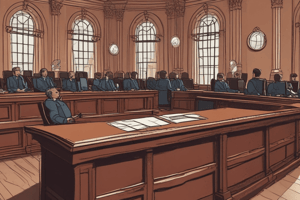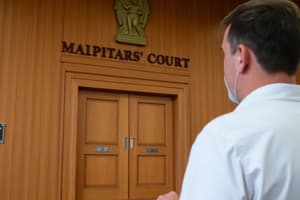Podcast
Questions and Answers
What must the prosecution be given before a magistrate can decide on a submission of no case to answer?
What must the prosecution be given before a magistrate can decide on a submission of no case to answer?
- A requirement to justify the charges.
- The chance to present additional evidence.
- The ability to cross-examine defence witnesses.
- An opportunity to make representations. (correct)
How do justices determine if there is a case to answer during a submission?
How do justices determine if there is a case to answer during a submission?
- By evaluating the general public opinion on the case.
- By considering if a reasonable bench could convict. (correct)
- By determining if the evidence satisfies a moral obligation.
- By assessing the likelihood of a jury decision.
What is the standard set out in Galbraith regarding the prosecution evidence during a submission of no case to answer?
What is the standard set out in Galbraith regarding the prosecution evidence during a submission of no case to answer?
- It cannot be so tenuous that a properly directed jury could convict. (correct)
- It must be substantial enough to warrant a jury's attention.
- It must meet the threshold for beyond a reasonable doubt.
- It should be conclusively shown to be credible.
What role does the credibility of prosecution witnesses play in a no case to answer submission?
What role does the credibility of prosecution witnesses play in a no case to answer submission?
Are justices obligated to provide reasons if they reject a submission of no case to answer?
Are justices obligated to provide reasons if they reject a submission of no case to answer?
What outcomes might result from a submission where evidence is deemed perverse?
What outcomes might result from a submission where evidence is deemed perverse?
What is the primary consideration for justices during a no case to answer submission?
What is the primary consideration for justices during a no case to answer submission?
Under what condition can a magistrate acquit the accused on the grounds of insufficient evidence?
Under what condition can a magistrate acquit the accused on the grounds of insufficient evidence?
What is the primary purpose of informing the defendant after a conviction?
What is the primary purpose of informing the defendant after a conviction?
What impression did the magistrates create in D's conviction that led to its quashing?
What impression did the magistrates create in D's conviction that led to its quashing?
What is the default position in magistrates' courts when an accused does not attend a trial?
What is the default position in magistrates' courts when an accused does not attend a trial?
What is a limitation on justices regarding verdicts on charges?
What is a limitation on justices regarding verdicts on charges?
Which of the following factors is NOT considered by the court when assessing the interests of justice related to an accused's absence?
Which of the following factors is NOT considered by the court when assessing the interests of justice related to an accused's absence?
In which situation might a court find an accused guilty of a different charge?
In which situation might a court find an accused guilty of a different charge?
What must the court do when an accused provides a legitimate medical note for non-attendance?
What must the court do when an accused provides a legitimate medical note for non-attendance?
What is the significance of a duty to give reasons for a verdict?
What is the significance of a duty to give reasons for a verdict?
In the case where the accused was excluded from the court but wanted to attend, what did the justices rule?
In the case where the accused was excluded from the court but wanted to attend, what did the justices rule?
What occurs when a magistrate wrongly convicts for a lesser offence?
What occurs when a magistrate wrongly convicts for a lesser offence?
What ruling did Underhill J make regarding the accused's exclusion from court?
What ruling did Underhill J make regarding the accused's exclusion from court?
Why might a false impression arise regarding the burden of proof in a case?
Why might a false impression arise regarding the burden of proof in a case?
What action is the court NOT obliged to take if no reason for absence is offered by the accused?
What action is the court NOT obliged to take if no reason for absence is offered by the accused?
How might a court handling of just driving offences differ from other charges?
How might a court handling of just driving offences differ from other charges?
How should the court address an accused's misbehaviour that leads to their exclusion from the trial?
How should the court address an accused's misbehaviour that leads to their exclusion from the trial?
What might be an implication of the justices' ruling regarding the accused's behaviour in court?
What might be an implication of the justices' ruling regarding the accused's behaviour in court?
What is the primary consideration for justices when evaluating a submission of no case to answer?
What is the primary consideration for justices when evaluating a submission of no case to answer?
What opportunity does the prosecution have when the justices are considering a submission of no case to answer?
What opportunity does the prosecution have when the justices are considering a submission of no case to answer?
What would justify a court in later overturning its first decision?
What would justify a court in later overturning its first decision?
In what scenario can an error of law form the basis for an appeal under s. 111 of the MCA 1980?
In what scenario can an error of law form the basis for an appeal under s. 111 of the MCA 1980?
In what manner are justices required to provide reasons for their verdicts?
In what manner are justices required to provide reasons for their verdicts?
What might influence a justice's decision to allow a trial to proceed despite a submission of no case to answer?
What might influence a justice's decision to allow a trial to proceed despite a submission of no case to answer?
What is the primary limitation placed on the power of a lower court to revisit its own orders?
What is the primary limitation placed on the power of a lower court to revisit its own orders?
Under which condition can a ruling take effect despite the absence of the accused?
Under which condition can a ruling take effect despite the absence of the accused?
If justices are provisionally inclined to dismiss a case based on no case to answer, what is their next step?
If justices are provisionally inclined to dismiss a case based on no case to answer, what is their next step?
Which of the following best describes the justices' stance on the credibility of witnesses during a no case to answer submission?
Which of the following best describes the justices' stance on the credibility of witnesses during a no case to answer submission?
What is required for an efficacious administration of justice regarding lower courts revisiting decisions?
What is required for an efficacious administration of justice regarding lower courts revisiting decisions?
What conditions are required for the review of a decision according to existing circumstances?
What conditions are required for the review of a decision according to existing circumstances?
What should a party do if they want a detailed explanation for a magistrate's decision?
What should a party do if they want a detailed explanation for a magistrate's decision?
What general principle guides justices when considering whether to acquit on no case to answer submissions?
What general principle guides justices when considering whether to acquit on no case to answer submissions?
What triggers the applicability of sections 8A and 8B regarding a decision?
What triggers the applicability of sections 8A and 8B regarding a decision?
What is the most infrequent reason for a court to overturn its first decision?
What is the most infrequent reason for a court to overturn its first decision?
Study Notes
Submission of No Case to Answer
- Credibility issues should not typically influence justices when considering a submission of no case; however, some may adopt a pragmatic approach if prosecution evidence appears unconvincing.
- Justices are generally required to allow a trial to proceed if a reasonable tribunal could potentially convict based on the prosecution evidence.
Prosecution's Right to Reply
- Justices must call on the prosecution for a response before upholding a submission of no case to answer, granting the prosecutor the opportunity to argue against dismissal.
Duty to Provide Reasons on Verdict
- Courts must give "sufficient reasons" when convicting or issuing a hospital order but do not need to provide an extensive judgment.
- Detailed reasoning can be requested if necessary, ensuring the defendant understands the basis for the conviction.
Accused Finding of a Lesser Offence
- Justices may only find the accused guilty or not guilty of the exact charge presented; they have no authority to convict for a lesser offence unless the case includes separate charges.
- Certain driving offences allow a conviction for a lesser charge even if only the greater charge is before the court.
Insufficient Prosecution Evidence
- Magistrates can acquit if prosecution evidence does not reasonably support a conviction, either on defense application or their own initiative, provided the prosecutor has a chance to respond.
Credibility of Prosecution Witnesses
- Justices should assess whether prosecution evidence is so weak that a properly directed jury could not convict, focusing on the evidence's strength rather than witness credibility.
Absence of Accused During Proceedings
- In magistrates' courts, absent defendants who knew about the trial date and did not provide justification are generally treated as voluntarily absent.
- The refusal to investigate the absence of a party is contingent upon the absence of reasonable justification.
Challenges Around Exclusion from Court
- A just ruling may occur despite a defendant's disorderly behavior leading to their exclusion; misbehavior does not negate their rights to attend.
Revisiting Court Decisions
- A court can only overturn previous rulings under specific conditions such as changed circumstances or overlooked details from the original decision.
- Generally, the common-law rule discourages revisiting decisions without substantial justification.
Procedure When a Party is Absent
- Specific rules govern trials when a party is absent, including exceptions for those who have submitted a guilty plea or when special procedures are applied.
- If the prosecutor is not present, the court retains certain powers to proceed.
Studying That Suits You
Use AI to generate personalized quizzes and flashcards to suit your learning preferences.
Related Documents
Description
This quiz covers key aspects of magistrates' court procedures, particularly the default position regarding the absence of an accused. It explores the responsibilities of the court when no reasons for absence are provided, as well as considerations for the interests of justice in such cases.




